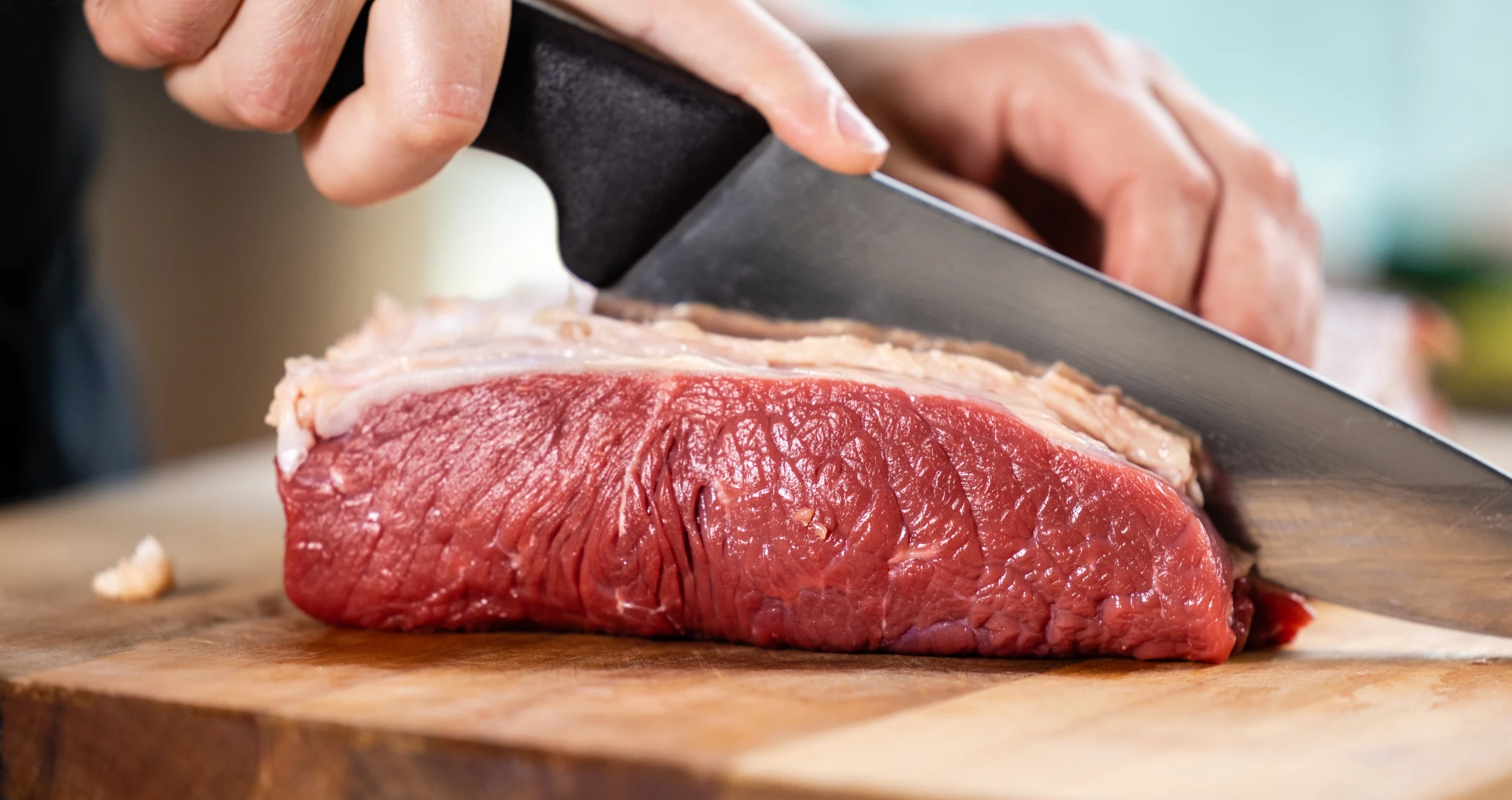Embark on a journey towards better health and well-being through ANZCO Foods beef and lamb.
Our beef and lamb nutrition story beings with our farmers who are the cornerstone of quality beef and lamb production. Our farmers play an integral role in ensuring the highest standards of quality and sustainability are met.
Protein
Protein is an essential macronutrient that plays a fundamental role in many daily functions in the body.
Beef and lamb are complete proteins containing all nine essential amino acids necessary for various bodily functions.
Protein facts
-
Plant protein vs meat protein
- You need 20-50% more plant protein to absorb the equivalent amount of amino acids as you would from red meat protein.
- Plant proteins are incomplete proteins, lacking some essential amino acids
- Red meat has more complete proteins, providing all essential amino acids.
- High quality animal proteins can often be lighter on calories and more nutrient dense than plant and highly processed protein
-
Muscles
- Protein aids in building bigger and stronger muscles and is crucial to prevent muscle loss and bone deterioration
- Assist in meeting your increased daily needs for muscle maintenance and recovery.
- It is important we eat enough dietary protein to prevent breakdown of muscle.
-
Quantity
- Aim for a minimum of 2.2g of protein per kg of your body weight per day to help build muscle
- There is about 50g of protein in 150g of cooked lean meat, aim for over 150g of protein a day and when you’re training, ramp it up.
- A 150g steak has as much protein as 7 eggs
- Older adults need around 25% more protein than younger adults to help maintain muscle mass and optimize muscle functions
- Children, adolescents, pregnant and breastfeeding woman need higher amounts of protein
- Lean red meat is light on calories yet protein and nutrient dense.
- For example, when comparing 100g of cooked lean rump steak to 100g of cooked lentils, one would need to eat approximately four times the amount of lentils (or one can of lentils) and over twice the amount of calories (420kcal) to get the same amount of protein as the rump steak
-
Energy
- Protein contains macronutrients that are required to fuel our bodies and provide us with energy.
-
Appetite
- Red meat protein helps regulate your appetite, keeps you fuller for longer, and takes more energy to digest than carbohydrates or fats.
- Have some leftover red meat as a side with your protein shake for breakfast
-
Amino acids
- Your body needs 20 different amino acids to function properly
- Lean red meat contains all the essential amino acids that your body cannot make

FUN FACT:
A 150g steak has as much protein as 7 eggs!
Micronutrients
ANZCO is dedicated to providing premium beef and lamb products that are packed with vital micronutrients such as iron, zinc and B vitamins.
Found abundantly in red meat, they combat issues like low IQ, autism, depression, and dementia.
Micronutrients facts
-
Zinc
- Important for
- A strong body and mind
- Maintaining a strong immune system
- Growth and development of children
- Fertility and reproduction
- Must be obtained through food - our bodies don't naturally produce zinc
- Important for
-
Iron
- Three main roles within the body
- Transports oxygen around the body
- Ensures a healthy immune system to defend against infection and disease
- Essential for energy and cognitive function to prevent fatigue and brain fog
- Consume beef or lamb 3 - 4 times a week to supercharge your iron intake
- Iron is the most common nutrient deficiency in the world
- Meat enhances the absorption of non-haem iron (plant based iron) by up to 2-3 times
- Eat vegies with meat to increase iron absorption
- Avoid tea or coffee immediately before and after your meal
- Don't rely on supplements, they can reduce the absorption of other essential nutrients, such as zinc and calcium
- The iron in pills or supplements and fortified foods such as breakfast cereal is poorly absorbed
- Three main roles within the body
-
Concerning iron stats
- More people suffer from iron deficiency than any other nutritional disorder in the world
- 14% of children under 2 are iron deficient.
- 8 out of 10 toddlers miss their daily dietary iron intake.
- 1 in 14 women are low in iron.
- Over 33% of teenage girls don’t achieve their daily iron requirements.
- You need to consume 30% more plant protein to get the same amount of absorbable protein from beef and lamb.
- Your body can use 15-25% of the iron in red meat, but only 5-12% of the iron in plants.
-
B12 and B3 Vitamins
- Essential for nourishing your body and brain
- Beef and lamb are one of the richest sources of B12
- B12 is only found naturally in foods of animal origin
- B12 is essential for forming red blood cells and DNA
- B3 is vital to help convert nutrients into energy, cholesterol and DNA repair

FUN FACT:
Hold off on that tea or coffee for 30 mins post-meal to ensure maximum iron absorption.
Why choose ANZCO Foods beef and lamb
-
Physical health
- Assists in building and maintaining muscle mass
- Aids in our body's recovery after physical activity
- Provides us with a source of energy for optimal functioning
- Assists with muscle growth and maintenance and immunity support, necessary to keep you performing at your best
-
Mental health & wellbeing
- A balanced diet, including beef and lamb, alongside vegetables, legumes, and whole grains, contributes to overall mental health and well-being
- In times of high stress, the micronutrients found in bred meat can help replenish and support cognitive function and mental clarity
- Iron intake is essential for neurotransmission functions, particularly for young females who are more vulnerable to iron deficiencies
- Over a third of teenage girls don't achieve their daily iron requirements
-
Maternal health
- Pregnant & breastfeeding women
- are vulnerable to iron deficiency as iron requirements increase to meet the needs otf the gorwing fetus and increase maternal blood volume
- Adequate iron intake supports maternal blood volume, early brain development, and overall energy levels
- Babies & toddlers
- Iron-rich foods are vital for proper brain development and cognitive function during early childhood
- Red meat offers critical nutrients necessary for their growth and development
- 8 out of 10 toddlers don't meet the recommended daily intake of dietary iron
- At 7 months, a baby needs more iron than their dad
- Teenage girls and woman
- Are at risk of iron deficiency
- Incorporating adequate beef and lamb into their diets can help combat iron deficiencies
- Red meat provides highly absorbable iron, supports vitality and reduces feelings of fatigue
- 1 in 14 NZ woman are low in iron
- 120g of beef provides 1/4 of a woman's daily absorbable iron needs
- Pregnant & breastfeeding women
Women’s health
Did you know 1 in 14 women is low in iron, with over 33% of teenage girls not achieving their daily iron requirements.
120g of beef satisfies a quarter of a woman’s daily absorbable iron needs.

FUN FACT:
120g steak equals the absorbable iron in 19 cups (1.4kg) of cooked silver beet.
Fuel up! Listen, read, eat...

Podcasts
Tune in for chats with elite kiwi athletes Braden Currie and Hannah Berry, leading nutritionists, coaches and psychologists or join Cam Harper and Brian Ashby for all things IRONMAN.
LISTEN
Nutritional insights
Keep up to date with what's happening between IRONMAN New Zealand and ANZCO Foods as we bring nutrition and good health from New Zealand's finest beef and lamb.
READ
Beef and lamb recipes
From Korean style beef bao buns to a butterflied leg of lamb, we've got some nutrient-rich mouth-watering recipes that can provide the energy boost you need to power through your day.
EAT